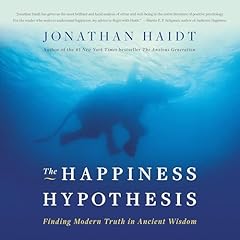
The Lucifer Effect
Understanding How Good People Turn Evil
No se pudo agregar al carrito
Add to Cart failed.
Error al Agregar a Lista de Deseos.
Error al eliminar de la lista de deseos.
Error al añadir a tu biblioteca
Error al seguir el podcast
Error al dejar de seguir el podcast
 Exclusivo para miembros Prime: ¿Nuevo en Audible? Obtén 2 audiolibros gratis con tu prueba.
Exclusivo para miembros Prime: ¿Nuevo en Audible? Obtén 2 audiolibros gratis con tu prueba.Compra ahora por $30.76
-
Narrado por:
-
Kevin Foley
-
De:
-
Philip Zimbardo
What makes good people do bad things? How can moral people be seduced to act immorally? Where is the line separating good from evil, and who is in danger of crossing it? Renowned social psychologist Philip Zimbardo has the answers, and in The Lucifer Effect
Drawing on examples from history as well as his own trailblazing research, Zimbardo details how situational forces and group dynamics can work in concert to make monsters out of decent men and women. Zimbardo is perhaps best known as the creator of the Stanford Prison Experiment. Here, for the first time and in detail, he tells the full story of this landmark study, in which a group of college-student volunteers was randomly divided into guards and inmates and then placed in a mock prison environment. Within a week, the study was abandoned, as ordinary college students were transformed into either brutal, sadistic guards or emotionally broken prisoners. By illuminating the psychological causes behind such disturbing metamorphoses, Zimbardo enables us to better understand a variety of harrowing phenomena, from corporate malfeasance to organized genocide to how once upstanding American soldiers came to abuse and torture Iraqi detainees in Abu Ghraib. He replaces the long-held notion of the "bad apple" with the "bad barrel" - the idea that the social setting and the system contaminate the individual, rather than the other way around.
This is a book that dares to hold a mirror up to mankind, showing us that we might not be who we think we are. While forcing us to reexamine what we are capable of doing when caught up in the crucible of behavioral dynamics, though, Zimbardo also offers hope. We are capable of resisting evil, he argues, and can even teach ourselves to act heroically.
©2007 Philip G. Zimbardo, Inc. (P)2011 TantorLos oyentes también disfrutaron:




















Reseñas de la Crítica
Las personas que vieron esto también vieron:


















The stories
Se ha producido un error. Vuelve a intentarlo dentro de unos minutos.
Paradigm shifted!
Se ha producido un error. Vuelve a intentarlo dentro de unos minutos.
I think everyone should listen to this at somepoint. It will help to make you into a bettet person that understands yourself better!
Everyone should listen to this at some point!
Se ha producido un error. Vuelve a intentarlo dentro de unos minutos.
Good Read
Se ha producido un error. Vuelve a intentarlo dentro de unos minutos.
Otherwise the information and the research which gleaned it is something that will make a person want to look in a mirror and wonder where they stand.
Interesting insight into the human condition
Se ha producido un error. Vuelve a intentarlo dentro de unos minutos.


